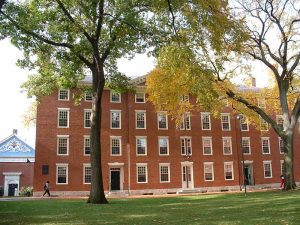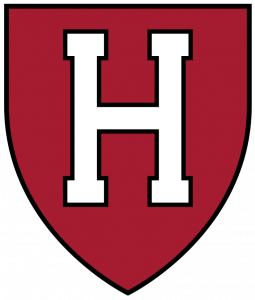Every five years, Harvard/Radcliffe asks its alumni/ae to submit a brief report about their life for a “Red Book” that is distributed widely. By coincidence, the deadline for submission was 1 December 2021, a special date for me, David Oaks.
Here is my report:
David W. Oaks ‘77

On the right of these two dormitories is Stoughton Hall in Harvard Yard, where I spent my freshman year.
I broke my neck on this day back in 2012. By coincidence, the 1st of December is also the due date for this Harvard and Radcliffe Class of 1977 Forty-fifth Anniversary Report. This is a special day of reflection for me, and a chance to focus on the last five years.
Back when I broke my neck, I was working in my writer’s studio in our backyard in Eugene, Oregon. I had trouble retrieving our cat, Bongo, from the loft. With wet shoes, I climbed the ladder to reach Bongo, my feet slipped forward through the rungs, and I fell back on the ground. Doctors had warned me that, because of years of spinal arthritis, I should avoid any such trauma. As I felt the paralysis coming up my body, I managed to make my last roll sideways and reach my cellphone to call my wonderful wife. While we waited for the ambulance and I felt the paralysis rising higher and higher, definitely risking death, I had time to look closely in her eyes and I said a strange thing: “I have been preparing for this moment my whole life.”
A brief recap of that life so far: All of my grandparents were immigrants from Lithuania. Both of my grandfathers were coal miners in Illinois for a total of 31 years, before moving to the South Side of Chicago. I loved my Gage Park neighborhood, but the poison of White Supremacist racism was horrible. When Martin Luther King, Jr. led a march through a nearby neighborhood, he later remarked that the hate he saw in the eyes of racists there was worse than in southern States. MLK was struck in the head by a rock thrown by hecklers.
But my older parents were very loving and progressive, and there was much that was positive about being raised in this working-class environment. However, when I won a union scholarship to attend Harvard, I became very worried the Summer before admission. One comforting gesture — do you remember this Class of ‘77? — Harvard sent us all a letter with suggested books to read, so that when we met other freshmen we could break the ice by comparing our insights.
When I arrived at Harvard Yard to my room in Stoughton Hall, as a brash, immature, working-class kid, I definitely felt out of place. I chatted with other arriving freshmen about one of the suggested books for us to read, The Glass Bead Game by Herman Hesse. If any of you remember the following perhaps you can clarify and contact me: We new students found out what we thought was a fact, Harvard would actually hold a quiz about these books. A quiz upon arrival? We panicked. But then we quickly found out that this quiz idea was a hoax perpetuated by the Harvard Lampoon. Is this an accurate memory?
Unfortunately, I became overwhelmed many times during my four years at Harvard. I did not have the support and counseling I needed. Five times I ended up in psychiatric institutions, including Harvard’s McLean Hospital, which had some folks trying to help me, but I also experienced incredible abuse such as routine involuntary psychiatric drugging and solitary confinement.
 On a positive note, in my junior year, Harvard’s volunteer agency, Phillips Brooks House, placed me as an intern with one of the early psychiatric survivor human rights groups. This community organizing would become my career. You see, hardly anyone knows about this marginalized community’s social change movement. But, like Black, Indigenous and People of Color (BIPOC) and the Lesbian, Gay, Bisexual, Transgender community (LGBT), people with lived experience of mental health care have also been organizing with each other internationally. Hardly anyone knows about what is sometimes called the “Mad Pride” Movement or Consumers, Survivors, Ex-inmates (c/s/x) Movement.
On a positive note, in my junior year, Harvard’s volunteer agency, Phillips Brooks House, placed me as an intern with one of the early psychiatric survivor human rights groups. This community organizing would become my career. You see, hardly anyone knows about this marginalized community’s social change movement. But, like Black, Indigenous and People of Color (BIPOC) and the Lesbian, Gay, Bisexual, Transgender community (LGBT), people with lived experience of mental health care have also been organizing with each other internationally. Hardly anyone knows about what is sometimes called the “Mad Pride” Movement or Consumers, Survivors, Ex-inmates (c/s/x) Movement.
Bill Gates was in our Harvard class. While we never met (I understand Bill was in Wigglesworth on Mass. Ave.), my path has brought me to meet thousands of equally brilliant folks who have used the mental health system and/or been abused by that mental health industry. I think of us as the “Marginalized And Different,” or the M.A.D.
Years later, when I began living in Eugene, Oregon, while sitting in a park, I was reading a book by Martin Luther King. He was describing his time in the South Side of Chicago. I then read a passage that startled me. MLK said he hoped that some of the younger people would get out of that area, get to college, and begin to heal from that poisonous racism. I recall feeling like MLK was directly speaking to me with that phrase. To this day, I fight White Supremacy, as we all ought to.
Here in Eugene, I found a great deal of support for psychiatric survivor organizing, and I helped start a nonprofit that is still one of the main independent coalitions for human rights in mental health: MindFreedom International (MFI). I got married to an incredibly supportive, creative, brilliant, hilarious friend, Debra Nuñez.
For 25 years, I was Executive Director of MFI. Then on 1 December 2012, I became a quadriplegic in a power chair with an impaired voice. I used to type 120 words per minute, now I type zero. But decades in the disability movement taught me resilience and gave me tools for recovery. My family thankfully created an irrevocable medical trust, which enabled me to lead a fulfilling life. As of today, we are holding a one-year campaign to support that trust. Oregon Law is rather unique in the country to allow such irrevocable medical trusts. A family member must create this, and my mother was still alive when I fell. She was astoundingly loving, and claimed the reason she lived to 97 was to help create my trust.
Thanks to my independent living from the trust, I launched a consulting business for what I call “Green Disability.” The name of our firm is taken from a Lithuanian word for “thanks”: Aciu! Institute (pronounced like a sneeze, ah-choo!). Clients have included the World Health Organization, and my former employer, MFI.
This past Summer, one of my fellow Stoughton Hall residents visited me: Wayne Eastman. Wayne is seeking to publish a book that explores important mental disability issues. What a delight to chat with this brilliant and supportive ‘77 alumnus. Whether or not you know me, you are encouraged to reach out, just use your search engine to find: david w oaks blog.
And this all brings me back to laying on that floor, with a broken neck, waiting for the ambulance. When Harvard admitted me, yes, I was certainly a flawed young man. But my experiences with mental and physical disabilities, and the support of so many people, have helped me address some of the systemic oppression issues that impacted my community growing up.
During these past five years, I’ve linked up the disability movement to fighting the climate crisis. Congratulations to Harvard leaders who won the campaign for divestment from fossil fuels! I think of one of the main leaders globally struggling for cleaner skies and treating nature better: Greta Thunberg. Years ago, experiencing severe mental and emotional issues, Greta was diagnosed as autistic. She calls this her “superpower” because this helps her look at obstacles and solutions more clearly.
Today, 1 December 2021, I think ahead seven generations. Greta wisely explains that her own personal philosophy is that at the end of her life, she wants to be able to look back and feel like she has done all that she could do about this crisis. That concept of looking back is familiar to me, because I have had at least one near-death experience. Let us all use these “final bites” for global justice and what is clearly needed and required: Revolution!
